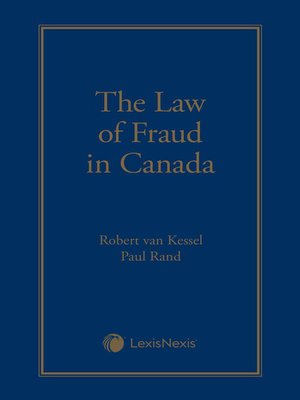
Sign up to save your library
With an OverDrive account, you can save your favorite libraries for at-a-glance information about availability. Find out more about OverDrive accounts.
Find this title in Libby, the library reading app by OverDrive.



Search for a digital library with this title
Title found at these libraries:
| Library Name | Distance |
|---|---|
| Loading... |
The concept of fraud is a central and core element of both civil and criminal law. If not properly controlled, fraud corrodes the integrity of personal and commercial relationships. The importance of the law's treatment of fraud cannot be understated.
At the same time, the experience of the Canadian legal system reveals fraud to be a surprisingly elusive subject. It is difficult to define, identify and prove. Fraud cases, whether civil or criminal, are notoriously difficult for lawyers to try and for judges and juries to decide.
In this book, Robert van Kessel and Paul Rand and provide an extraordinarily useful resource to meet the challenges posed by a case of fraud.
The book is comprehensive. It deals with all aspects of fraud, including problems of definition, proof and remedies. It deals with both civil and criminal fraud and draws on both the common law and the Quebec civil traditions. The book discusses the law's treatment of fraud in a wide variety of areas where fraud is prevalent and problematic: fraudulent preferences, securities fraud, identity fraud and real estate fraud.
The research is exhaustive. The authors draw upon the classic principles of fraud elucidated by the English common law and the Quebec Civil Code and then carefully trace the way Canadian courts have developed and refined those principles. The authors offer a critical appraisal of the cases, clearly stating what the courts have said, not hesitating to offer constructive criticism of the current state of the law, and offering constructive suggestions for refinement and improvement.
The book is also accessible, well organized and clearly written. The reader will find no difficulty in locating the pertinent principle placed in its proper analytical context.
The Law of Fraud in Canada is the first place anyone dealing with a fraud case should look for guidance. The authors are to be applauded for the diligence and scholarship that is so evident on every page of this book.







